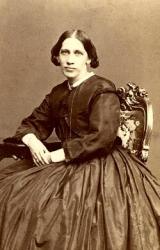Here’s what we know: The author of the hymn, “Children of the Heavenly Father”, was Karolina Sindell-Berg (1823-1903). She was Swedish, small and sickly as a child, and very close to her Lutheran pastor father. With 650 of her 2,000 hymns appearing in print, she is sometimes called the Fanny Crosby of Sweden. Among her best known hymns are “Children of the Heavenly Father” and “Day by Day.” Swedish singing star Jenny Lind provided the front money for the first printing of Sindell-Berg’s hymns.
Here’s what we don’t know: There are multiple possibilities of what prompted Sindell-Berg to write the hymn “Children of the Heavenly Father.” One version has it that when she was 26 years old, she and her father were boat passengers of an ill-fated lake crossing. Her father fell overboard and she saw his drowning. The English translator of the hymn, Ernst William Olson, thought this was the case when he titled the hymn “A Hymn Born of a Broken Heart.”
Another possibility is that she wrote the hymn earlier, possibly in her late teens, as a response to the turbulent conditions in Europe. The first version of her hymn made no mention of children, only faithful Christians throughout history. The stanzas we see in print today are not all the stanzas Sindell-Berg wrote. One of the omitted stanzas seems to suggest the political unrest of the time:
Praise the Lord in joyful numbers:
Your Protector never slumbers.
At the will of your Defender
Every foeman must surrender.
It was the translator that changed the text to include children, and it has been a song for and about children ever since.
We don’t know who composed the tune TRYGGARE KAN INGEN VARA. It is sometimes said to be a Swedish folk song, but is also known to have been sung as a German folk song. It is sometimes attributed to Oskar Ahnfelt, a Swedish musician and hymn writer. Other times (and probably most likely), Ahnfelt is credited with simply setting the hymn to the folk song.
Here’s what matters: A simple tune, a lovely poem and poetically graceful translation have come together to give us a song of calm assurance, protection and rest.
The hymn is a particular favorite in the many communities of the American mid-west founded by Swedes and Scandinavians. Garrison Keillor talked about it in “Singing with the Lutherans:”
“I once sang the bass line of ‘Children of the Heavenly Father’ in a room with about 3,000 Lutherans in it, and when we finished, we all had tears in our eyes, partly from the promise that God will not forsake us, partly from the proximity of all those lovely voices. By our joining in harmony, we somehow promise that we will not forsake each other.”
The first four stanzas are the ones usually included in hymnals today.
Children of the heav’nly Father
Safely in His bosom gather;
Nestling bird nor star in Heaven
Such a refuge e’er was given.
God His own doth tend and nourish;
In His holy courts they flourish;
From all evil things He spares them;
In His mighty arms He bears them.
Neither life nor death shall ever
From the Lord His children sever;
Unto them His grace He showeth,
And their sorrows all He knoweth.
Though He giveth or He taketh,
God His children ne’er forsaketh;
His the loving purpose solely
To preserve them pure and holy.


Wonderful hymn and choral singing.
LikeLike
Thank you, Suzanne. So glad you enjoy these hymns and stories.
LikeLike